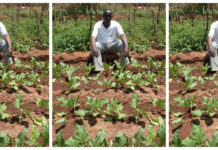Author and social activist Jackie Phamotse has learned from her mistakes on social media and wrote a book so you can too.
Phamotse set tongues wagging last year when she got dragged to court for a series of tweets. In the tweets, Phamotse claimed there was “a sex tape involving the husband of a well-known media mogul with a younger rapper”. Media personalities Basetsana and Romeo Kumalo took her to court, and she lost the case. The court ordered Phamotse to refrain from making comments about them on social media in future.

“I have had my own social media experiences where I was accused of cyberbullying and accused of defamation online. I’ve shared what happened, what’s the outcome and how people can prevent such things from going further. That was one of the main reasons I wrote this book,” Phamotse said in an interview with The Daily Vox.
The result is a 339-page social media guide that combines hard facts and research with personal narrative. “There are some notes that are more warm-hearted, they’re not as academic as most of the book,” she said about the structure of the book.
This is Phamots’s second book, she released her first book Bare: The Blesser’s Game in 2017.
I Tweet What I Like has a bit of everything you need to know to be on social media. It has advice on how to grow your following, cash in on trends, and monetise your profile. But it also has legal advice and helps the reader understand the implication of what they tweet.
“It’s from person to person how they use the book,” Phamotse said.
Phamotse has watched social media evolve
A veteran on social media, Phamotse watched social media evolve from Mxit and BBM to MySpace, Skype and Facebook and now WhatsApp. But Twitter, she said, is a “whole other world.”
“You can see global conversations happen right on your phone screen. The numbers scale in seconds whether it’s retweets or comments,” Phamotse said. “Because it’s so instant, a lot of the time people don’t really understand the implications of what they post,” she said.
Phamotse can say this from experience. In July last year, when she tweeted that she had seen the sex tape, folk on Twitter interpreted this as referring to Basetsana and Romeo Kumalo.
The magistrate ruled that she harassed Basetsana Kumalo in the tweet, even though Phamotse made no direct mention of her. If Phamotse violated the order, the magistrate ruled that she could be arrested.
When Phamotse went to court, she found that the comments on her tweet were infringing on someone’s rights. She had to take responsibility for the comments people made about the Kumalos because it was her tweet.
“When I was in that legal battle, I had to sit with my lawyers and find out what my rights were and how I could protect myself. How do I teach people differently?” Phamotse said. Phamotse discovered that there aren’t that many laws about social media in the country.
During the case, Phamotse and her legal team researched digital laws in South Africa. “We discovered there is no department in South Africa that specifically deals with digital laws. A lot of police officers would not even understand how to record the crime unless there’s a physical threat like stalking. But there is a violation, even if it just online,” she said.
“We looked at that and said: how do we force government to really look at this the way they look at rape or kidnapping so they skill the police force to handle these violations?” she said.
“They talk about the fourth industrial revolution all the time but are they ready? No,” Phamotse said.
Sometimes it’s best to just ignore the trolls
On social media, it’s easy to get caught up in your online persona or the online persona of others.
In her book, Phamotse also wrote a chapter about choosing who we follow wisely. We need to ask ourselves, she said, how we choose the people we follow, why we follow them and how they affect us on a day to day basis? It’s not healthy to follow people who are constantly posting negativity or dragging others.
It’s also very easy to get caught on the other end, and dragged for your views. “I always look at that and I’m biting my tongue,” Phamotse said about the call out culture on social media.
On February 18, South African musician DJ Cleo visited another musician Brickz, who is serving 15 years in prison for rape, and was dragged for it. Gender activists called DJ Cleo out for his insensitivity.
Phamotse said this example shows how easy it is to be misunderstood online. “When DJ Cleo posted a picture of him with Brickz in prison, everyone came for him. They dragged him for days. He said he was saying people in jail also need rehabilitation and we need to visit them so when they come out they have learned from their mistakes. But it quickly went left,” she said.
This example, she said, shows that what you choose to put online can affect your reputation. Phamotse also said it’s important to be careful what you put on social media, because you can easily be dismissed at work for it.
“Sometimes it’s better to stay away, worry about your own personal reputation. It’s just choosing our battles online,” Phamotse said.
Social media is (mostly) changing the world for the better
Despite the negatives, “social media is good,” Phamotse said. “You can find work to tuition money, advice, counselling and even prescriptions”, she said. Even some investigations were cracked online, where live-streams, car number plates, or the faces of perpetrators surface online and aid the investigation. People even find lost pets and family members when posting about it online. “You see those miracle stories, incredible stories,” Phamotse said.
“We need to be more educated about social media and try to use it as positively as we can,” she said. And now we have a book to do just that.
I Tweet What I Like retails for R290,00 and is available at good bookstores and online. The book launch will take place at Exclusive Books in Sandton City on March 1 at 18:00.









